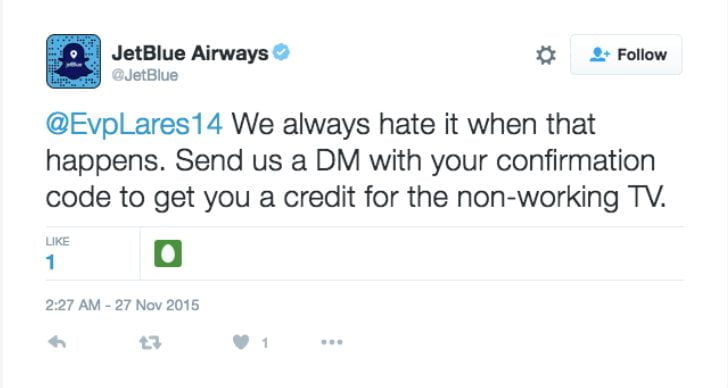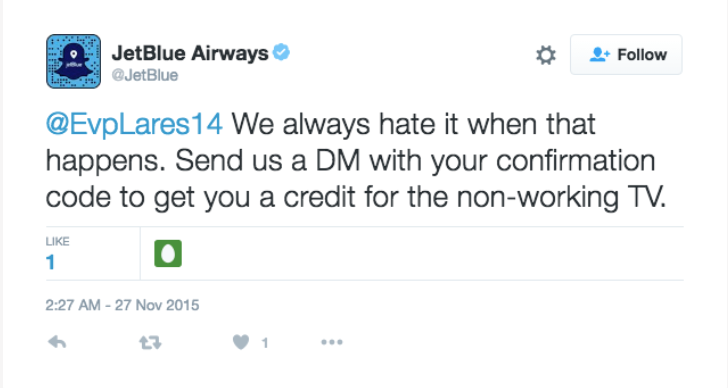Customer reviews are one of the most important pieces of your marketing campaign, and research has indicated they may have significant impact on your ranking in search.
In fact, 84% of consumers trust an online review as much as they would a personal referral. However, not all reviews are positive. At some point throughout the history of your business, you’re going to run into negative reviews.
Fortunately, this doesn’t always have to be a bad thing – negative reviews can work in your favor as a business opportunity if you know how to react. Read below to learn the most effective ways to respond to negative online reviews.
Stay positive
Anyone who’s ever worked customer service knows how difficult it can be when a customer is attacking you. A negative review may get you upset, and as a human being your first instinct is to go on the defense, but that doesn’t mean you should become a keyboard warrior and attack the reviewer (unless you’re Wendy’s, of course, who recently spouted off Twitter battles with McDonald’s and customers alike). Unless you’re a multimillion-dollar fast food company, we don’t advise getting snarky.
Approach all negative reviews with a calm, positive attitude. Let the customer know you’ve heard their concerns, but never point fingers. Even if you’re not in the wrong, you shouldn’t make the customer feel like the victim.
It also doesn’t do you any good to simply ignore the review. The general public would prefer you respond than simply ignore the situation. Responding with a positive comeback will show that your business cares about its customers.
Offer a solution
Have you ever heard the phrase, “Sorry won’t cut it”? This is the case when you’re responding to negative comments or reviews. Simply offering an apology to your customer won’t do – a customer will want a solution to their problem. When you’re responding to a negative review or comment, let the customer know how you’ll fix the problem.
Below is an example of a great response that offers a solution. A JetBlue customer tweeted that their in-flight TV was not working. JetBlue immediately responded with this:
This response shows that JetBlue is empathetic towards their customer’s concerns. Then they follow up with an immediate solution.
It’s safe to say this customer appreciated the time this company took to solve their problem in a timely manner. They instantly redeemed themselves and showed their customer’s happiness is their priority.
Reiterate your company’s policies
You may fear that a negative review will make your company look bad. This is only the case should you ignore the review entirely. When you respond to a negative comment, flip the negative to a positive. Use this as an opportunity to reiterate your company’s good qualities.
For example, you can respond by saying, “We’re sorry you had a poor experience. We’ve been doing business for several years and most of our customers leave happy. We’re sorry we didn’t meet your expectations this time around.”
Take the conversation offline
When you receive a negative review online, you should always respond immediately on the same platform. This not only satisfies the original poster, it’s also a public place that all your potential customers will see.
However, some things can’t be addressed online. Issues involving a customer’s personal information, for example, should be discussed in person or over the phone. When addressing these types of negative reviews, provide a direct contact for your customers.
Taking the conversation offline shows that your business will go the extra mile to resolve any customer complaints or issues. However, you should only use this method for severe cases.
Does your company have a customer service line? This can also be a great way to incorporate an offline conversation. In your response, give the customer the line to your customer service department to resolve any issues that can’t be taken care of online.
Approach the customer as a real person
We’ve all experienced the nightmare that is automatic bots. Calling into a customer service line and hearing a robot on the other end is one of the most frustrating situation a customer can go through. Consider this when you’re responding to your customers. Leave out all the industry jargon, and speak to them like they’re a real person – because they are!
When you use plain language and speak to the customer as a human being, you’ll sound more genuine. Chances are, your customers will see you as a human as well, and not just as a business.
Google has also taken measures to ensure that you, the business owner, isn’t dealing with automated customer reviews. This solution is called verified customer reviews, and I’ve previously written about ways that you can use the feature to come out on top.
Ask for an update
If you’ve responded to the customer’s review and solved the problem, don’t hesitate to ask for an updated review. Often times customers will take this upon themselves and either delete or update their negative review. Here’s an example of an updated review after an issue was solved:
As you can see, many review sites, like Yelp, will show that this is an updated review. Once you’ve solved the customer’s issue, politely ask them if they’ll update the review online.
Having trouble thinking of a nice way to ask? Once you’ve followed up with the customer, ask them something such as, “We appreciate your feedback, and would like other customers to know how we’ve solved your issue. Would you mind updating your review to reflect this?”
Always make sure you thank them for their feedback, regardless if they update the review or not.
The takeaway
As soon as you see a negative review, your heart instantly sinks. But no matter how stellar your business is, you’re not going to make everyone happy. A few negative reviews won’t be the end of your business. Use these reviews as an opportunity to showcase your company’s outstanding customer service.
The sooner you rectify any issues your customers have, the sooner you’ll build better rapport with your customer base.
What tactics would you add to this list? Let us know the comment section below.
Amanda DiSilvestro is a writer for HigherVisibility, a full service SEO agency, and a contributor to SEW. You can connect with Amanda at AmandaDiSilvestro.com.


